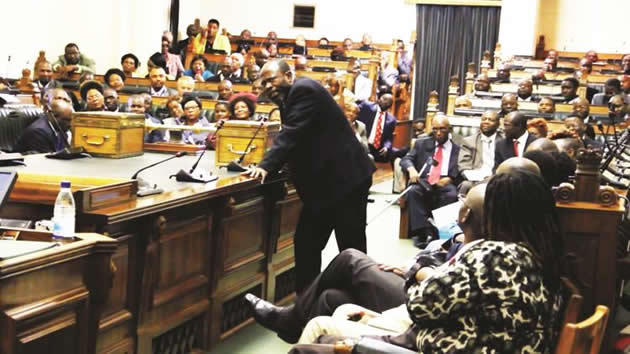Are our MPs slaves of the whipping system?


ABOVE: While Zimbabwe boasts a large pool of experts in various fields in Parliament, they cannot apply their aptitude in scrutinising and pointing out deficiencies in proposed legislation for fear of being labelled sell-outs. Munyaradzi Gwisai (right) is one of the casualties of the whipping system
Lloyd Gumbo Mr Speaker, Sir
University of Zimbabwe law lecturer Professor Lovemore Madhuku recently made a thought-provoking point about the need for parliamentarians to defy their political party positions on issues they do not agree on.
He made the remarks at a meeting between parliamentarians and civil society organisations organised by the Zimbabwe Lawyers for Human Rights where he urged MPs to follow their conscience even if it meant that they would be expelled.
“You can’t be seeing shadows everywhere,” he said.
“MPs should be fired and there will be a public reaction. If you are courageous, you have to express your views. If you are not courageous, you are not a politician.”
A public outcry, he said, would force a rethink and change of policy by the powers that be.
But the question is how many MPs would entertain the prospect of being expelled for following what conscience tells them considering that Parliament is a source of livelihood for some of the lawmakers?
There is something amiss with democratic tenets when MPs are more scared of their political parties than the people who elected them.
Do we elect our representatives through a democratic process so that they lose their freedom of thought, conscience and speech when they get into the august House?
While our third arm of the State has been described as spineless and docile, backbenchers from both Zanu-PF and MDC-T attribute their senile contributions to the whipping system for fear of being sacked.
Some of the MPs who have already faced this scourge since the turn of the millennium include former Highfield MP Munyaradzi Gwisai of the MDC, who was recalled by the party in 2003 for supporting the land redistribution exercise when his party was against it.
The MDC led by Professor Welshman Ncube sacked three MPs -Abedinico Bhebhe (Nkayi South), Njabuliso Mguni (Lupane East) and Norman Mpofu (Bulilima West) – in 2009 after they voted in favour of working with the MDC-T.
But should MPs be forced to abdicate their beliefs and conviction and what their constituents want just because the party finds it unpalatable?
Should they blindly toe the party line like zombies even if their conscience tells them otherwise?
Isn’t this an affront to democracy and killer of integrity and right to freedom of thought, speech and expression?
As a result, real issues are ignored in Parliament while they focus on trivial matters because of the fear factor.
Instead of threatening legislators, authorities must convince backbenchers based on the merits of their proposals and be prepared to make compromises if necessary.
Governments, rather than relying on threats, must convince their backbenchers of the case for each of their measures, do deals with other parties or make compromises over their legislation. On the whole, that is a thoroughly good thing.
Proposed national budgets and Bills even during the inclusive Government have been imposed on MPs and passed without reasonable scrutiny from the legislature because some party officials had already made a decision that the proposed law must pass without amendment.
For instance, MPs are whipped into approving the proposed budget without scrutinising it and when ministers then appear before parliamentary portfolio committees, they blame MPs for passing the Budget when they knew it had deficiency of allocations.
You see the hypocrisy!
While we can have a pool of experts in various fields in Parliament, they cannot apply their aptitude in scrutinising and pointing out deficiencies in proposed legislation for fear of being labelled sellouts.
Polarisation has not helped matters as MPs rarely debate in favour of motions sponsored by their counterparts from the other party regardless of their merits.
I spoke to some Zanu-PF and MDC-T legislators who claimed whipping was behind their lame contributions.
“Every time we debate, we preoccupy ourselves with making sure we don’t say what the party may deem to be against its policies,” said a Zanu-PF lawmaker.
“For instance, there was a motion by James Maridadi on Zesa, it would have made sense that every Zimbabwean supports it. But we had some comrades from the party opposing it when it’s public knowledge that some mechanisms have to be put in place to address the power shortages.
“Often times, we leak what we consider sensitive to our colleagues in opposition so that they can say it out in Parliament while they do the same. As MPs across the divide we know our mandate but whipping monster constrains us.”
An MDC legislator said: “It is difficult for us to support motions that emanate from Zanu-PF in the same manner they don’t support our motions. We have lost our right to conscience and independent views. We drop our views and pretend to be who we are not by either supporting or shooting down motions from the parties.”
But is this good for democracy?
At best an MP is chosen by the people and some vote for him or her because they think the individual is the best bet in character and ability to drive their needs and wishes home.
Our poor candidates vie for the posts at the pretence of common viewpoint as they agree in principle and on the whole to the policies of the sponsoring party. This is where the whole problem begins because as the time flies and MPs become more knowledgeable even when they want to raise a voice of dissent they find their hands tied and unable to voice.
There is nothing wrong with parliamentarians speaking in support of their party’s election manifesto but there is everything wrong with a situation where legislators are then denied the right to scrutinise proposed legislation that comes before the House.
However, proponents of the whipping system believe since the majority of MPs are elected on the party ticket they must then owe their allegiance to the party.
They argue that since political parties must be held accountable to the mandate on which they were elected, the whipping system is therefore a very effective way of doing this.
The question then is should parliamentarians be accountable to their political parties and not the electorate who sent them to Parliament?
What purpose does the system serve if it denies people’s representatives a right to speak their mind?
- Feedback: [email protected]











Comments